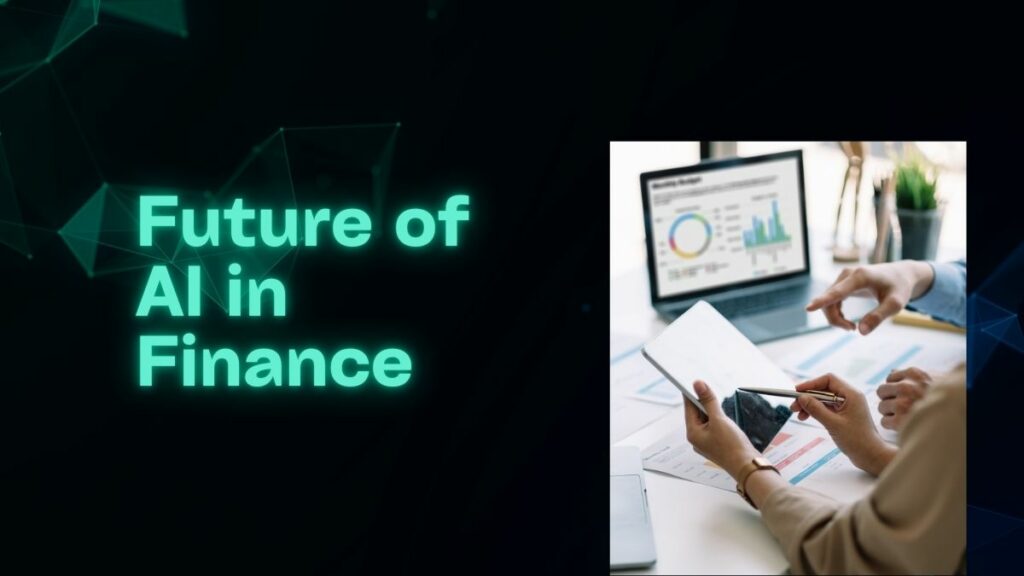Last updated on October 8th, 2024 at 10:45 am
Artificial Intelligence (AI) accelerates banking and financial tasks from fraud detection to algorithmic trading. It has become indispensable to financial firms of all sizes. AI is the future of finance, and companies that don’t adapt may be left behind.
Let us learn about the future of AI in finance with the help of the latest trends and predictions for the coming years.
Top AI in Finance Trends
Here are our top trends on the future of AI in finance for the next decade and further.
1. Financial Advice
AI can analyse vast datasets to provide highly personalised financial advice based on individual needs, risk tolerance and goals. This essentially implies its increased accuracy and effective financial planning.
The tools used in AI can suggest financial strategies such as portfolio adjustments or budgeting tips to help individuals achieve their financial objectives.
2. Robo-Advisors
Robo-advisors are getting smarter. They can handle complex financial situations and provide tailored investment strategies. They’re a more affordable alternative to human advisors, making financial advice accessible to more investors.
These can integrate with other financial tools such as budgeting apps and retirement calculators.
3. Fraud Prevention
AI can monitor transactions in real-time for suspicious activity, detect fraud and stop losses. It can analyse huge amounts of data to find patterns and anomalies that might indicate fraudulent behaviour like unusual spending or unauthorised access.
Additionally, AI can take proactive measures such as blocking suspicious transactions or asking for more verification. To understand this in detail, consider opting for AI learning courses that focus on the overall role played by AI in finance.
4. Predictive Risk Assessment
AI can analyse multiple factors including economic indicators, market trends and individual risk profiles to give a more accurate risk assessment. It can simulate scenarios to help institutions anticipate risk and develop mitigation strategies. Some of these scenarios include:
- Economic downturn: AI can simulate the impact of a recession on various industries and financial institutions.
- Geopolitical events: AI can model the consequences of political instability, trade wars, or natural disasters on global markets.
- Lack of workforce: AI may impact the future workforce and economy.
Other events include technological disruptions caused by tech like blockchain or quantum computing, cybersecurity, and climate change.
5. Blockchain and AI
The use of AI in finance extends beyond just overlooking transactions. It can further simplify these transactions through smart contracts which are self-executing contracts with the terms written in code. Simultaneously, blockchain provides a secure and transparent ledger. Using this information, AI can detect and prevent fraud within the blockchain.
6. Trading Platforms
AI-powered trading platforms can trade fast and frequently, using complex algorithms to find trades. AI can also give you a personalised trading experience based on your preferences and risk tolerance. Read about the innovative applications of AI in finance to know more.
7. NLP in Finance
One thing often taught in AI in finance courses is using natural language processing for carrying out communicative tasks. NLP allows AI to understand and respond to language so we can talk to financial services through chatbots, virtual assistants and voice-activated tools. Here are some examples of NLP’s role in finance.
- Chatbots and virtual assistants: NLP-powered chatbots and virtual assistants can answer questions and help users manage their finances. For instance, a chatbot could help you check your balance, make a payment or report a lost card.
- Voice-activated tools: It can create voice-activated tools allowing you to control your finances with your voice. You could ask your voice assistant to move money between accounts or pay a bill.
- Sentiment analysis: A financial institution can utilise NLP to analyse social media posts and customer surveys. With this information, it can find areas to improve the customer experience.
8. Credit Scoring
AI can look at factors beyond traditional credit history—alternative data sources and credit behaviour. This can help extend credit to deserving populations, those with a limited credit history or those who have been unfairly denied credit previously.
9. Insurance Underwriting
AI provides a more personal and efficient insurance experience from underwriting to claims. It can detect fraudulent claims by looking for patterns and anomalies in insurance data. AI can work on large amounts of data including insurance risks more accurately, so insurers can price more competitively and offer more personal insurance products.
Final Thoughts
Ready to get into AI and level up your career? Join Imarticus’s Executive Programme in AI for Business. This AI Learning course will render you the knowledge and tools to go hands-on with AI and lead in finance.
So, what are you waiting for? The future of finance is here, and it’s here to stay.
Frequently Asked Questions
How is AI changing the way we invest?
The use of AI in finance enables the flow of personalised investment advice, automated trading, and risk assessment, which, in turn, make investing more efficient and save time.
What are the potential risks of AI-based finance?
Potential risks associated with AI in finance include biased algorithms, job displacement, and the frequent misuse seen in fraudulent activities.
How can I learn more about AI in finance?
Consider taking online courses, attending conferences, or reading specialised publications. These steps will help you stay updated on the latest trends and developments.
What is the future of AI in finance?
The future of AI in finance is promising, with potential applications in areas like predictive analytics, regulatory compliance, and digital currencies.

